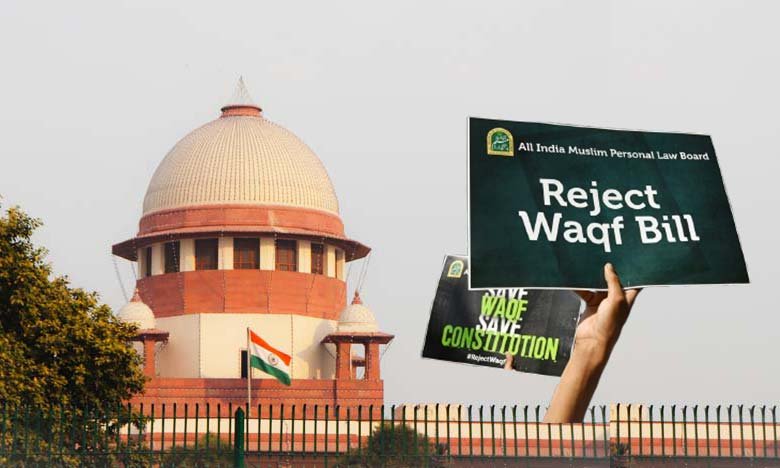CJI Expresses Concern Over Cancelling Waqf by Users; Lawyers Strongly Oppose Controversial Waqf Law, Hearing Postponed Till Tomorrow

New Delhi, 16 April (www.deccanlive.com): While protests continue across India from the Muslim community against the Waqf Amendment Act, several Muslim organizations and leaders are also fighting it legally. Today, the Supreme Court of India heard 73 petitions challenging the new Waqf (Amendment) Act 2025.
A constitutional bench led by Chief Justice of India Sanjiv Khanna, and including Justice Sanjay Kumar and Justice KV Viswanathan, began hearing arguments about whether the amended law is valid under the Indian Constitution. Senior advocates Huzefa Ahmadi, Kapil Sibal, Abhishek Manu Singhvi, and others presented strong arguments against the law.
The petitioners said that the amended law interferes with religious practices, which are protected under Article 26 of the Constitution. Senior lawyer Kapil Sibal said, “Many parts of this law clearly violate Article 26.” He explained that the law now requires a person to prove they have practiced Islam for five years before they can dedicate property as Waqf. He questioned, “If I was born a Muslim, why do I need to prove this? My personal religious laws should automatically apply to me.”
Chief Justice Khanna also questioned the Solicitor General Tushar Mehta about the religious structure of the Waqf Board. He asked, “Are you saying you will now allow Muslims to be a part of the Hindu Endowment Board? Be clear.”
On Wednesday, the Supreme Court questioned the BJP-led central government about whether it would allow Muslims to be included in Hindu trusts, as it began hearing arguments on the constitutional validity of the Waqf (Amendment) Act 2025.
The hearing has been postponed until tomorrow for further discussion.
The Supreme Court of India has expressed concern about the new rule that allows individuals (users) to cancel Waqf property. The court especially questioned how old mosques — some built between the 14th and 16th centuries — can be registered or proven as Waqf properties when they don’t have official sale deeds.
Chief Justice of India (CJI) Sanjiv Khanna said, “Many old mosques do not have registered documents. How can you ask for proof or registration for something that has existed for centuries?” He warned Solicitor General Tushar Mehta that changing the status of such waqf properties could lead to serious problems.
There are 73 petitions in the Supreme Court challenging the Waqf (Amendment) Act 2025. The petitioners say the new law causes religious discrimination, reduces protection of Waqf lands, and allows the government to take control of Muslim religious properties. They argue that the law violates fundamental rights.
On the other hand, the Modi-led government says the amendment is meant to bring transparency in how Waqf properties are managed.
Many Muslim organizations and political parties have filed petitions against this law. These include:
- All India Muslim Personal Law Board
- Jamiat Ulama-e-Hind
- Dravida Munnetra Kazhagam (DMK)
- Indian Union Muslim League
- YSR Congress Party
- AIMIM President and MP Asaduddin Owaisi
- Congress MP Mohammad Javed
- RJD MP Manoj Kumar Jha
- TMC MP Mahua Moitra
- MLAs from Kerala, Delhi, and other states
- Imam of Jama Masjid Bangalore
- Communist Party of India (CPI)
- Tamil actor Vijay (TVK President)
- Association for Protection of Civil Rights (APCR)
Meanwhile, BJP-ruled states like Rajasthan, Gujarat, Haryana, Maharashtra, Assam, Uttarakhand, and Chhattisgarh have submitted documents in support of the new law. The central government has also filed a caveat (a legal notice to prevent any action without informing them).





